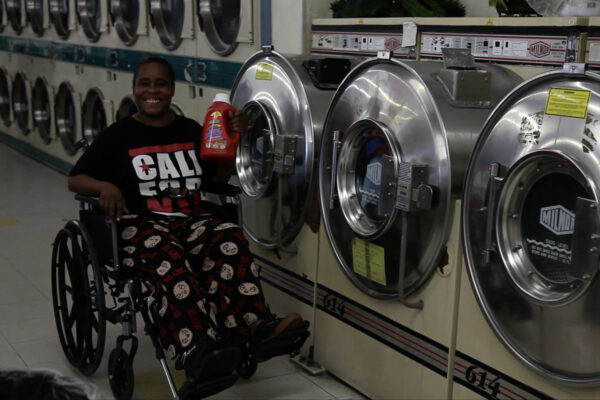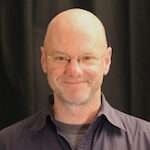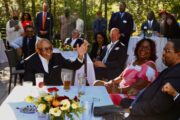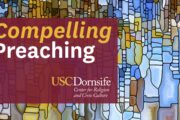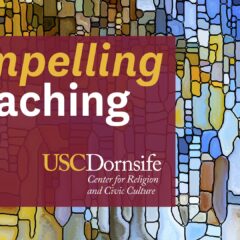This post originally appeared on Al Jazeera America.
HARBOR CITY, Calif. — From the Pacific Coast Highway exit off the freeway in Harbor City, it is impossible to miss the towering exhaust stacks of the Phillips 66 petroleum refinery and the mammoth cranes of the Los Angeles-Long Beach port complex. This is working-class L.A., 21 miles away and a world apart from the velvet-roped wonder of Tinseltown.
Across PCH from a payday loan shop and next door to a trailer park, King’s Laundry seems an unlikely vessel for hope in difficult times. But on a Thursday night in December, as a cheerful crowd of more than 100 men, women and children gathered in a parking lot to enjoy hot dogs, hearty soup and Christmas tunes played live by a church band, hope was exactly the thing on offer — in the form of free loads of laundry, courtesy of the volunteers who donate money, labor and laundry soap at Harbor City’s twice-monthly Laundry Love event.
“It’s amazing that a Laundromat could change your life!” said Sylvia, who asked to be identified only by her first name. The shy, soft-spoken 52-year-old has been a Laundry Love regular for two years. “I live on my own and have a low income, a fixed income,” she explained. “But it’s not just about laundry — they reach out to me and treat me with so much kindness. No one judges you here. We’ve become friends.”
While saving a handful of quarters a couple of times a month can make a big difference for people living in challenging circumstances, Sylvia’s experience highlights what makes Laundry Love different: For “guests” and volunteers alike, the events are seedbeds of community.
“What I try to ingrain in my folks is that we’re not trying to serve ‘those people,’ ” said Derrick Engoy, the pastor of the Branch, a church group that organizes the event in Harbor City and supplies most of the two dozen volunteers needed to make it happen. “We’re trying to ‘become’ those people and become a community. So it’s not like doing charity. You’re really just doing life with the people you serve.”
Laundry Love is an online network of mostly faith-based groups holding events at more than 90 participating Laundromats across the country. It was born, according to the website, of a conversation with T-Bone, of Ventura, California, who was homeless. When asked how his life could be enriched, he replied, “If I had clean clothes I think people would treat me like a human being.” Now the clothes-washing events are held at participating Laundromats all over the country. Participating is simple: Anyone who is interested can download a free guide on how to partner with a local Laundromat and build a group.
“We wanted to work with people of all faiths and people of no faith,” said Greg Russinger, who cofounded Laundry Love as a local service project sponsored by the Bridge Communities, a church in Ventura. He hoped to engage his congregation in a new way of “doing church.” In a phone interview from Oregon, where he is now the pastor at Portland Foursquare church, he said, “The common thread is that they truly believe in the neighbor aspect of Laundry Love … We wanted to tap into this desire to work toward the common good.”
That openness to all comers is precisely what attracted Esther Fino to Laundry Love. A retired teacher, she regularly volunteers at the group’s events in Harbor City.
“I’m Jewish,” Fino said as she and another volunteer took a break from helping guests load laundry into a row of heavy-duty wall-mounted washers. “The interfaith aspect is important to me … The people from [the Branch] knew that I wanted to give back to the community, and they welcomed me. A lot of places aren’t like that. It’s like you’re someone ‘other.’”
Laundry Love provides a way for individuals from different socioeconomic and cultural backgrounds to overcome that sense of otherness, knitting disconnected strangers into a community. That seemingly simple process has profound implications for everyone involved. According to Ricardo Reyes, who was struggling to make ends meet when he went to his first Laundry Love event about six months ago, the people he has gotten to know are much more to him than familiar faces.
“You ask anybody here, it’s just a great way of helping people survive,” said Reyes,. “That’s on the low. On the high, they’ve also given me companionship, friendship as well. They’ve become, it’s safe to say, a family. It’s very important to me, actually. Not just for me but overall for the community itself.”
Nick Street was a senior writer with the USC Center for Religion and Civic Culture.
